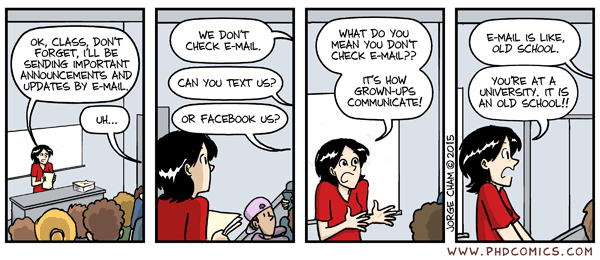De rebote me invitaron a participar en unas jornadas sobre Universidad y Humanismo, organizadas por el Grupo de Universidad-Investigación IT (Institución Teresiana) con la propuesta de hablar sobre TIC (qué es un término que no me gusta demasiado) y Universidad.

Se celebraban durante la última semana de agosto.
Como siempre, agradezco la oportunidad de participar en foros como este porque nos obligan a pensar de manera más formal en los temas que nos proponen porque el objetivo final es tratar de lanzar ideas más o menos coherentes.
Además en esta ocasión me permitía volver a Ávila, donde por azares de la vida habíamos pasado unos días bien majos el año pasado.
Se concretó en un par de sesiones hablando sobre las Universidades y su relación con la sociedad en la primera, y sobre tendencias en la segunda.
Se celebró en un ambiente muy agradable y en las sesiones de coloquio surgieron preguntas y debates interesantes.
Dejo aquí las presentaciones por si pueden ser de interés para alguien:
Por la mañana:
Hablábamos de las herramientas que las universidades (pero sobre todo las personas que las componen) pueden utilizar para comunicarse con la sociedad, la actitud y tratábamos de animar a que más personas difundan sus actividades: quitarse el miedo a participar, ofrecer contenidos valiosos,...
Por la tarde:
Hablábamos de las tendencias y todos los intentos de diversas empresas para mejorar la educación, tratando de ligarlo con otras iniciativas pasadas y con los avisos oportunos sobre lo difícil que es hacer predicciones. Si leen por aquí saben que soy muy partidario de todas las herramientas y creo que la existencia de más canales hará que más personas puedan aprender de maneras que estimen convenientes; aunque no tengo claro que las universidades vayan a desaparecer o ser sustituidas a corto/medio plazo.
También aproveché para hablar de otros temas como las redes sociales de investigadores, y otras oportunidades que les proporciona internet en estos momentos de manera un poco incipiente.
Nota adaptada de
En Áila hablando de TIC y Universidaad.
 Se acaba de publicar el número de septiembre de ReVisión, la revista de la Asociación de Enseñantes Universitarios de la Informática.
Se acaba de publicar el número de septiembre de ReVisión, la revista de la Asociación de Enseñantes Universitarios de la Informática.


